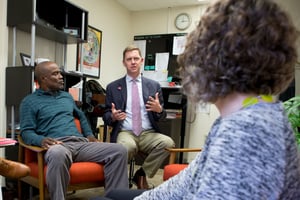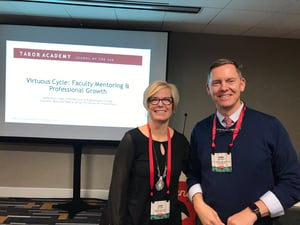Just over three years ago, Tabor committed to resourcing its faculty with access to Mind-Brain Education (MBE) research to further inform our curricular and pedagogical choices, across all areas of school life. The Center for Transformative Teaching Learning (CTTL) has translated much of the jargon-based research into readily applicable strategies for designing curriculum, cultivating learning environments, and fostering lifelong learning, significant portions of our professional practice. As a Pioneer Partner School with the CTTL, we were well-positioned to make significant gains in the strategic priorities we outlined for our school relative to Faculty (professional learning) and to the Tabor Experience (student learning and achievement).
 In particular, our reprioritization of Diversity Equity and Inclusion (DEI) initiatives six years ago was inextricably linked to Mind-Brain Education pursuits. The MBE research on learning has revealed that cognition and emotion are inseparable; minimizing sources of negative emotion is essential to lowering the barriers for enduring learning. If we feel threatened (think: fight-flight-freeze), no deep learning is likely to occur. So, finding ways to engage the parasympathetic system during learning will accelerate the creation and strengthening of learning pathways for students. To accomplish this, a student must feel known and validated for who they are. This occurs when a child believes she is safe from threat and embarrassment, when he is listened to and heard, and that their unique story matters to the teacher, coach, dorm parent, and is relevant to the learning at hand.
In particular, our reprioritization of Diversity Equity and Inclusion (DEI) initiatives six years ago was inextricably linked to Mind-Brain Education pursuits. The MBE research on learning has revealed that cognition and emotion are inseparable; minimizing sources of negative emotion is essential to lowering the barriers for enduring learning. If we feel threatened (think: fight-flight-freeze), no deep learning is likely to occur. So, finding ways to engage the parasympathetic system during learning will accelerate the creation and strengthening of learning pathways for students. To accomplish this, a student must feel known and validated for who they are. This occurs when a child believes she is safe from threat and embarrassment, when he is listened to and heard, and that their unique story matters to the teacher, coach, dorm parent, and is relevant to the learning at hand.
 To further expand our faculty’s collective capacity and efficacy for establishing these types of learning environments, we have pursued an impressive array of related professional learning opportunities. In addition to the thirteen faculty this past summer (and forty in total over the past three years) who attended the CTTL Science of Learning and School Leadership Academy, Tabor faculty participated in the Multicultural-Teaching Institute, Stanley King Counseling Institute, Visions: Change and Equity Workshop, and the National Diversity Practitioners Institute. Even in the midst of a busy fall trimester, which included the NEASC Accreditation Visiting Team, Tabor faculty have been looking for further MBE research-informed DEI avenues to modulate appropriate learning challenges and make course, departmental, and co-curricular learning outcomes relevant. Tabor had the largest number of practitioners at the Association of Independent Schools of New England (AISNE) workshops for admission professionals “Examining Equity Practices in Enrollment: Exploring Implicit Bias”, for residential faculty “Supporting International and Domestic Students in the Residential Program”, and for academic day faculty “Teaching While White.” In addition to these workshops, Tabor was well represented at the AISNE Annual DEI Conference in October and in December at the National Association of Independent Schools’ annual DEI conference, the People of Color Conference (POCC).
To further expand our faculty’s collective capacity and efficacy for establishing these types of learning environments, we have pursued an impressive array of related professional learning opportunities. In addition to the thirteen faculty this past summer (and forty in total over the past three years) who attended the CTTL Science of Learning and School Leadership Academy, Tabor faculty participated in the Multicultural-Teaching Institute, Stanley King Counseling Institute, Visions: Change and Equity Workshop, and the National Diversity Practitioners Institute. Even in the midst of a busy fall trimester, which included the NEASC Accreditation Visiting Team, Tabor faculty have been looking for further MBE research-informed DEI avenues to modulate appropriate learning challenges and make course, departmental, and co-curricular learning outcomes relevant. Tabor had the largest number of practitioners at the Association of Independent Schools of New England (AISNE) workshops for admission professionals “Examining Equity Practices in Enrollment: Exploring Implicit Bias”, for residential faculty “Supporting International and Domestic Students in the Residential Program”, and for academic day faculty “Teaching While White.” In addition to these workshops, Tabor was well represented at the AISNE Annual DEI Conference in October and in December at the National Association of Independent Schools’ annual DEI conference, the People of Color Conference (POCC).
Additionally, our full faculty offered the students a late sleep on the morning of November 7 so we had enough time with a guest presenter and provocateur, Jini Rae Sparkman, who challenged us to meet the following aspiration: “We have the opportunity many times a day, every day, to be the one who listens to others, curious rather than certain…I know I need to talk to you to discover those. I need to learn to value your perspective, and I want you to value mine. I know we don’t have to agree with each other in order to think well together. There is no need for us to be joined at the head. We are joined by our human hearts.” (Margaret Wheatley). Culminating this exploration of what we learn and lead in school communities, Head of School, John Quirk, offered each faculty member their own copy of Culturally Responsive Teaching & the Brain, by Zaretta Hammond.
Even further texture has been added to our MBE-aligned DEI pursuits by our engagement with the Global Education Benchmark Group and our in-house strength of partnering on and off-campus with the Special Olympics of Massachusetts and other local service organizations, and building adult affinity groups. Not even halfway through the school year and this compilation of initiative and investment counts for over half our faculty.
As the director of the CTTL likes to remind us, as educators we are “brain changers.” And in this realm, Tabor faculty are emerging as industry game-changers in supporting our students in their learning through neuroeducation research and the DEI practices that further shape their individual and collective Tabor experiences.
(Special thanks to the CTTL and its MBE “Place Mat” that guides our faculty every day and is cited heavily throughout this article).








